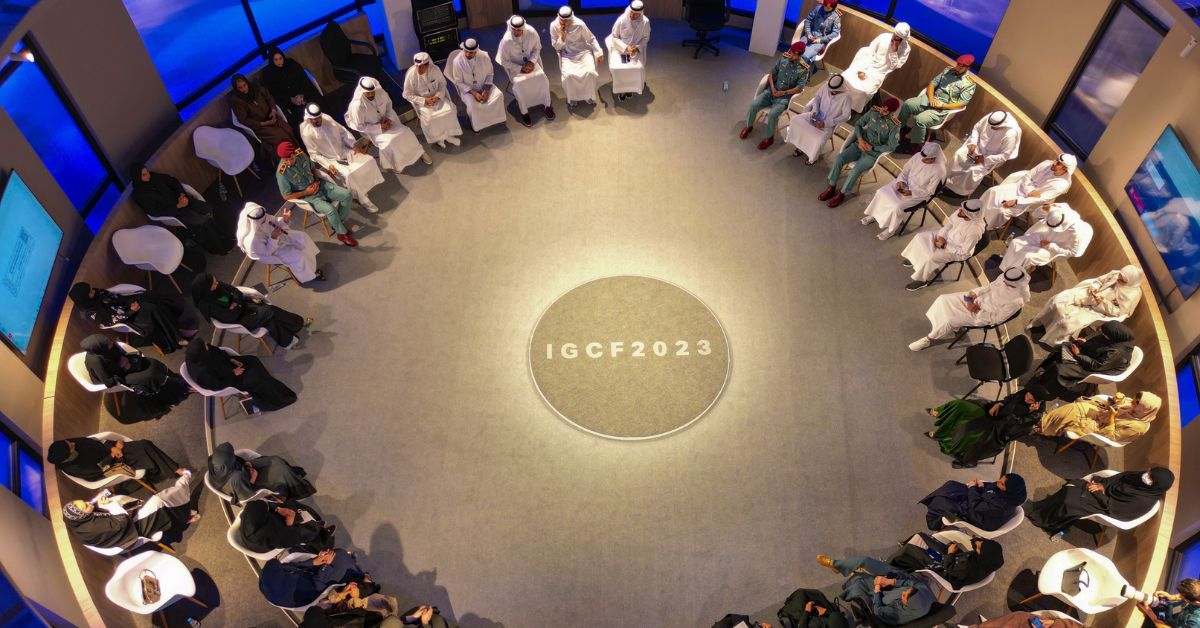SHARJAH – In a world where technology dominates daily life, the need for digital transformation to empower various sectors is undeniable, said Dr. Mohamed Hamad Al Kuwaiti, Head of Cybersecurity for the UAE Government.
Emphasizing that it’s essential to regulate technology and overall policies to ensure cybersecurity and ethical AI use, he stressed the necessity of local regulations in addition to international standards.
He spoke at a thought-provoking session during the International Government Communication Forum (IGCF) in Sharjah, which brought together experts and thought leaders to explore the profound ethical questions raised by artificial intelligence (AI).
Titled “Robot Ethics: Asimov’s Predictions,” the panel discussion delved into the practical implications and ethical challenges posed by AI.
The session turned to the pivotal role of AI in cybersecurity, with Sheikh Salman bin Mohammed Al Khalifa, CEO of the National Center for Cybersecurity in Bahrain, shedding light on AI’s capacity to enhance security.
“AI’s ability to process vast amounts of data quickly is indispensable in identifying and mitigating cyber threats. Humans can’t analyze gigabytes and terabytes of data at one go. AI tools not only expedite threat analysis but also offer valuable insights, although overall human supervision remains essential,” he stressed.
Phaedra Boinodiris, author of the book “AI for the Rest of Us,” and co-founder of the Future World Alliance, delved into the imperative of setting ethical standards and controls for AI.
Pointing out that while “AI is being used to make life-altering decisions, even organizations with good intentions can inadvertently cause harm,” Boinodiris underscored the importance of asking hard questions about data, consent during the data-gathering phase, etc.
Koh Jean, Chairman of the Presidential Committee of Digital Platform Government in South Korea, offered insights into the challenges posed by generative AI and the need for regulations to reduce AI hallucinations, defects, copyright infringements, and personal data leaks.
He stressed that generative AI, while promising, should not be permitted to make moral decisions. “This is illustrated by the classic ‘trolley dilemma,’ the fictional scenario in which a person has to make the choice of diverting a trolley about to hit and kill five people, by directing it to just one person. AI cannot be allowed to take such calls.”
The discussion then shifted to data privacy, a topic of increasing concern. Al Kuwaiti noted that information and data are today’s treasures, and the unethical procurement of personal data must be prevented. “It’s the duty of governments and digital/social platforms to protect data. Our children use these platforms. AI can play a pivotal role in combating cyberbullying and misinformation, protecting the values of individuals, societies, and countries—we must see AI as a partner,” he said.
As AI technology advances, cybercriminals leverage tools like WormGPT, designed to create malicious viruses specifically for attacking institutions, noted Al Kuwaiti. “Keep in mind the deceptive capabilities with which generative AI like ChatGPT can be used to craft emails or content that closely resemble genuine communications, making it difficult to distinguish between authentic and fraudulent messages,” he said.
While discussing data protection, Al Khalifa pointed to the need for coordinated regulations at the GCC level, akin to the EU’s approach, to hold companies accountable for violating trust and privacy. He advocated for the encryption of data, particularly in digital platforms and first-party levels, not just second- or third-party.
Author and expert Phaedra Boinodiris highlighted that building trust in AI is a social problem, not merely a technical one. Touching on the importance of fairness, explainability, transparency, and audits in AI systems, she stressed the need for AI development to include diverse perspectives and lived experiences compared to the small group of people currently developing it.
Koh elaborated on the role of governments in regulating generative AI, revealing that the Korean government’s efforts to safely use LLMs (large language models) and to actively engage the public to form a consensus on managing AI.
The session concluded with a discussion on the evolving nature of ethics across different cultures and the need for a “Cyber Geneva Convention” to establish common ethical standards in AI. Eventually, AI should consider the end-users and align with local cultural and religious values, said Al Khalifa, who suggested that governments should collaborate with tech companies to adapt algorithms to suit local viewers and users.








